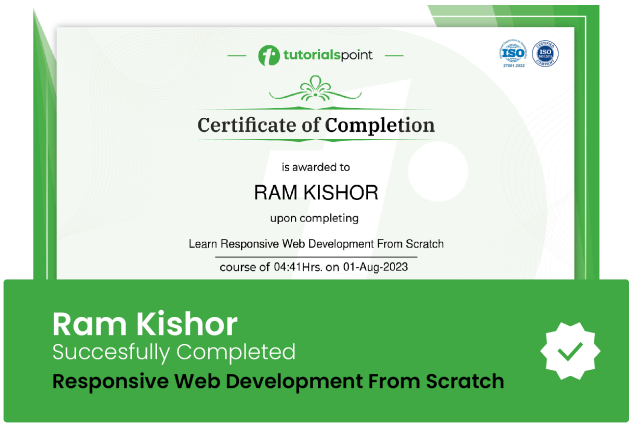good content
Automation With Ansible Playbooks
Orchestrate advanced automation techniques with Ansible Playbooks in this comprehensive online course.

Lectures -60
Resources -12
Duration -15.5 hours

30-days Money-Back Guarantee
Get your team access to 10000+ top Tutorials Point courses anytime, anywhere.
Course Description
Ansible is an open-source automation tool that can be used to automate IT tasks, such as provisioning servers, configuring systems, and deploying applications. Ansible playbooks are Ansible's configuration management language, and they are used to define the tasks that Ansible should perform.
Automation with Ansible Playbooks Overview
The target audience for this course is systems or automation engineers with a few years of experience in managing various parts of the infrastructure, including operating systems, application configurations, and deployments.
This course also targets anyone who intends to manage systems and application configurations effectively and in an automated way, with the shortest learning curve.
This course is perfect for:
Anyone who wants to learn Ansible automation
System administrators
DevOps engineers
IT professionals
Anyone who wants to automate IT tasks
Goals
What will you learn in this course:
Ansible Engine with Ad-hoc commands
Implementation of Ansible Playbooks from basic level to advanced level
Ansible Installation and Configuration with directory structure and Architecture
Ansible Ad-hoc commands
Ansible Facts and Variables
Ansible Inventories (Static and Dynamic Inventories)
How to work with Managed nodes if managed nodes are not installed with Python
Password Authentication setup and explanation
Introduction to Ansible Playbooks
Operations on strings and numbers using Playbooks (Filters and Methods )
Operators to work with tasks
Conditional Statements, loops, tags, and handlers
Block module and its usage
Template module variables, conditional statements, and loops
Ansible Vault Concept.
Prerequisites
What are the prerequisites for this course?
PC or Laptop with an internet connection
Knowledge to create servers from VMware/Any Cloud

Curriculum
Check out the detailed breakdown of what’s inside the course
Introduction
3 Lectures
-
Preview of the course: Automation using Ansible - Step by Step 04:25 04:25
-
Introduction: Story before Ansible or Any other configuration Management tools 09:46 09:46
-
Ansible Architecture 10:44 10:44
Installing and Configuring Ansible
8 Lectures

Ansible Ad-hoc commands
8 Lectures

Ansible Facts and Variables
2 Lectures

Ansible Inventories (Static and Dynamic Inventoryies)
2 Lectures

Passwrod Authentication setup and explanation
2 Lectures

Ansible Variables
1 Lectures

Introduction to Ansible Playbooks
3 Lectures

Basic concepts to write Playbooks (Working with different variables)
4 Lectures

Visual Studio Code Editor for Ansible Playbooks
1 Lectures

Operations on strings and numbers using Playbooks (Filters and Methods )
1 Lectures

Operators to work with tasks
3 Lectures

Conditional Statements
3 Lectures

Introduction to handlers
1 Lectures

Loops
1 Lectures

Tags
1 Lectures

Error Handling ( ignore_errors,failed_whenblock, rescue and always)
1 Lectures

Ansible reusable concepts with: import_tasks,include_tasks
1 Lectures

Loacal_action vs delegate_to
1 Lectures

Tomcat Installation and Configuration using Playbook
1 Lectures

Template module
2 Lectures

AWS Provisioning Using Ansible
8 Lectures

Ansible-Roles
1 Lectures

Instructor Details

VRTechnologies
eCourse Certificate
Use your certificate to make a career change or to advance in your current career.

Our students work
with the Best


































Feedbacks
ok
Excellent
Related Video Courses
View MoreAnnual Membership
Become a valued member of Tutorials Point and enjoy unlimited access to our vast library of top-rated Video Courses
Subscribe now
Online Certifications
Master prominent technologies at full length and become a valued certified professional.
Explore Now


 Updated on Apr, 2024
Updated on Apr, 2024
 Language - English
Language - English